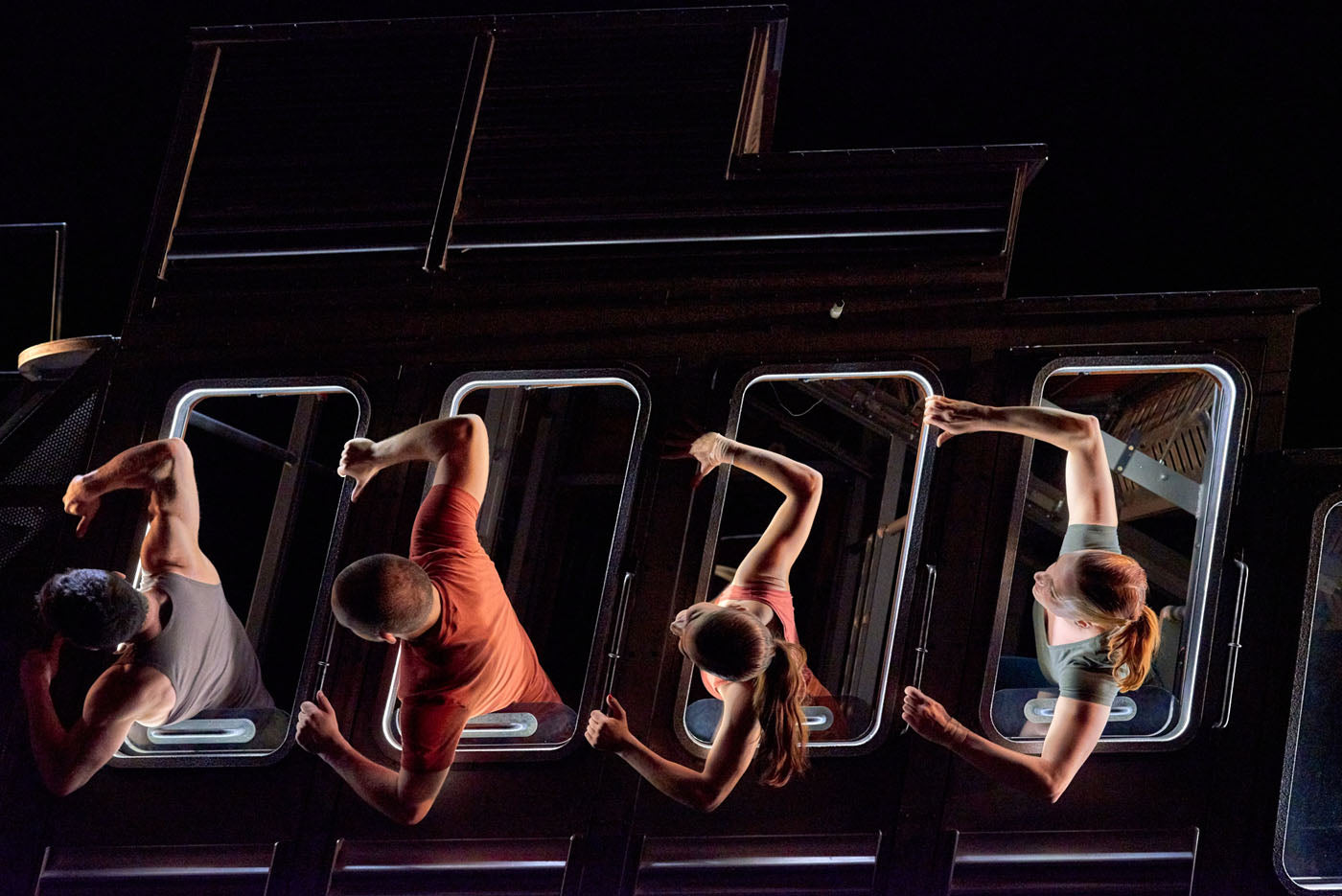After all, celebrating a quarter century is no small feat, especially in the City of Angels, where dance has often been relegated to a lesser art form on the cultural totem pole. But Heim, whose troupe is now in its 18th year of international touring, received a much deserved hero’s welcome, with his latest work, “Passengers,” completing the program.
That work, choreographed by Leandro Glory Damasco Jr. (with collaboration by the dancers), is an emotional roller coaster on a set that breaks apart and comes together, alternately resembling, among other things, a locomotive, a subway car, a submarine and a stairway—to heaven or hell, depending on your viewpoint, and recalling the staircase of Heim’s 1995 work, the Magritte-influenced farce, “Tête en L'Air.”
Designed by longtime Diavolo partner, Adam Davis, the work’s structure (Davis’ sixth for the company), is constantly re-configured by the 10 dancers by dint of their brute strength, where an occasional respite, albeit a kinetic one, bumps up against a vigorous and surreal sensibility. Heim calls “Passengers” a “mind trip—a piece about people caught in the wild loop of their shifting states of mind.”
And so it is.
With an original score by Bruno Louchouarn, music that veers from the obvious train sounds to haunting violins and ominous electronica, the 30-minute work is a dark look at mere mortals—or in this case, demi-dance gods and goddesses—as they leap, cavort, swan dive and determinedly march to the sounds of a 21st century sometimes gone amok.
Clad in Brandon Grimm’s colorful street clothes—yellows, blues, oranges reminiscent of an open box of Crayola Crayons—the dancers (Grimm among them), seem to be in perpetual motion, whether rolling or sliding down a forbidding staircase in one scene, wielding large suitcases overhead in another, and jostling for attention as, yes, passengers, in an Amtrak-like tableau. Jessie Ryan, a standout in red and representing a collective angst and longing, moves with grit and grace, and, when paired with Connor Senning, their duets are bold and fervent.
Indeed, this is a work in which everything is at stake: life, limbs, identities and intentions. Moods also shift with lighting changes (designed by Evan Merryman Ritter), be they the harsh whites of interrogation mode that instil fear, or the cool ambers suggesting a quasi-calm.
And then there are those piercing crimsons that are a frenzied call to order and reason—or not. Because in Heim’s world, reason is not always apparent, especially when it morphs into attitude and challenges the notion of survival at any cost. The director’s work has often been called circus-like, too acrobatic, not dancerly enough (Heim choreographed the long-running Las Vegas Cirque du Soleil epic, “KA”), but emotions are on display and connections are forged here, with the audience and between performers.
“Passengers” and its companion piece, “Cubicle,” comprise the larger work, “L.O.S.T. Losing One’s Self Temporarily” (the world premiere is in Oregon next month), and with this diptych, as well as other recent works, notably the Los Angeles Philharmonic commissioned trilogy, “L’Espace du Temps,” a deeper humanity is revealed. Yes, these are dancers able to execute flips as they descend from the tops of structures into the arms of waiting compatriots, with trust paramount, but they also move with a stealth and slowness that cry out for introspection.
It is this kind of art that keeps Diavolo on the front lines of dance, with its crowd-pleasing “Trajectoire,” which was reworked in 2001 and now features an expanded cast, exploring the lighter side of the company. Included were dancers Chisa Yamaguchi, in her eighth season with the troupe, Ryan, a fourth year veteran, Ezra Masse-Mahar and Damasco Jr., both in their fifth seasons, and Diavolo alum, Jones Welsh, founder of Not Man Apart Physical Theatre Ensemble, returning for this piece’s risk-intensive adrenaline rush.
Here the troupe indulged in continuous flights of jumping, sliding, pirouetting and faux cabrioling on, around and inside Daniel Wheeler’s eternally tilting, lit-from-within craft. (John E.D. Bass’s lighting design, after Daniel Ionazzi’s original scheme, had the dancers, when immersed inside the structure, recalling Kara Walker’s silhouette figures.)
Set to Nathan Wang’s original score—a propulsive, synthesized affair punctuated with harp sounds and Taiko drums—the 35-minute work is not exactly a “Titanic” scenario, but watching the gravity-defying feats of these astonishingly courageous performers leaves the viewer in a state of heightened apprehension: Will they or won’t they, these superhumans, get crushed under the structure; land safely into the hands of their dexterous partners after soaring through the air; stay upright and stolid while the roiling turbulence of their own devising never seems to abate?
Such stomach-churning moments are thrilling, and, together with the notion that a human being is both fragile and powerful, reckless and cautious, ecstatic and sad, but most of all, alive, makes a Diavolo concert a profound and entertaining experience. As Heim’s philosophy explores the relationships and interactions between the body and an architectural environment, one leaves the troupe’s concerts with a heightened sense of self.
This self, then, wishes a happy 25th anniversary to Diavolo|Architecture in Motion. Long may they fly!




comments